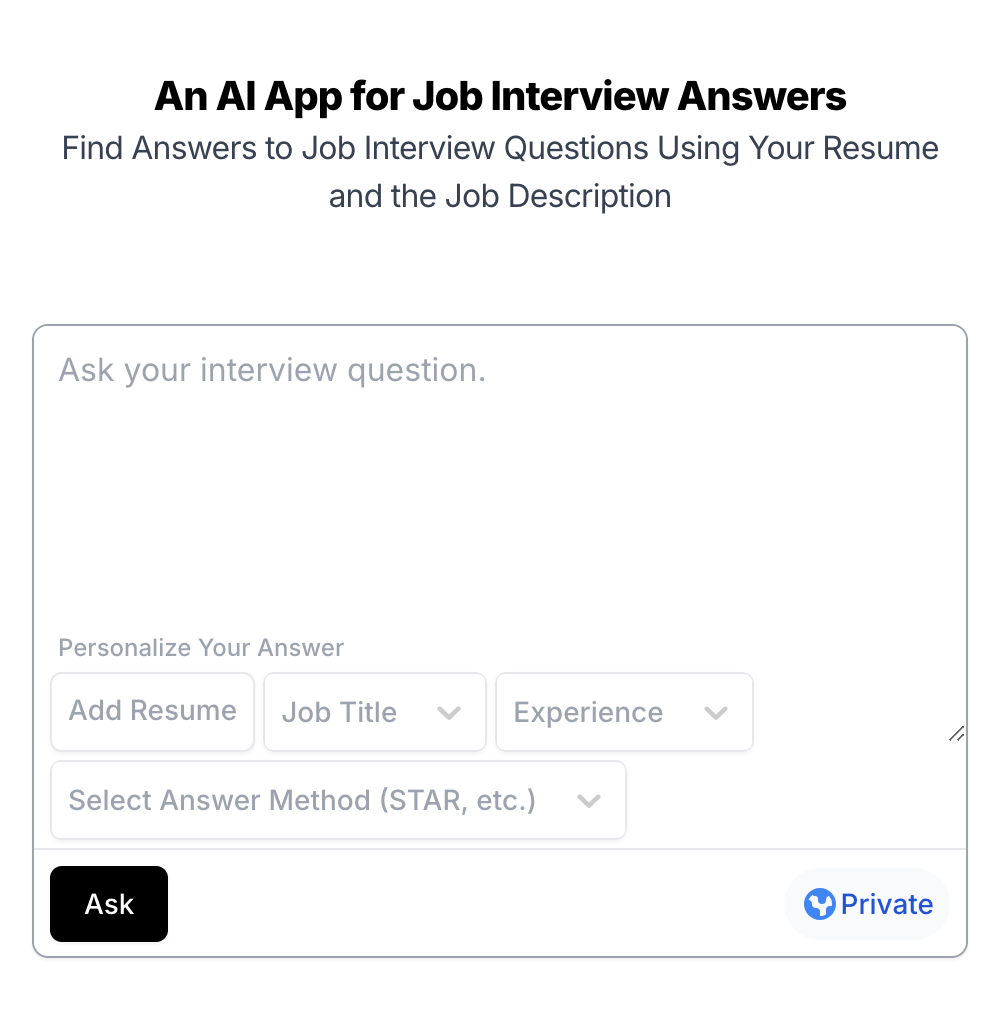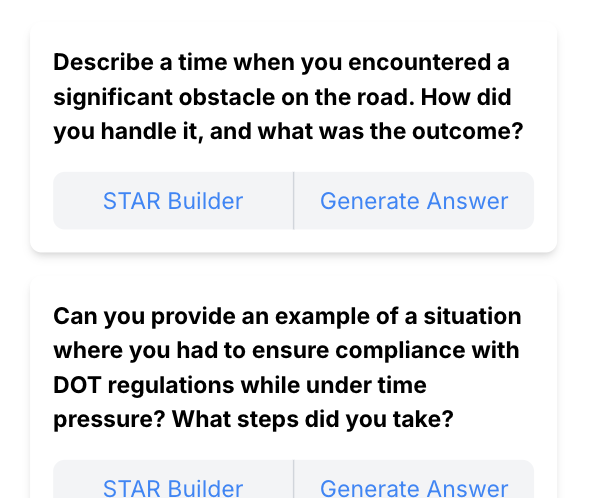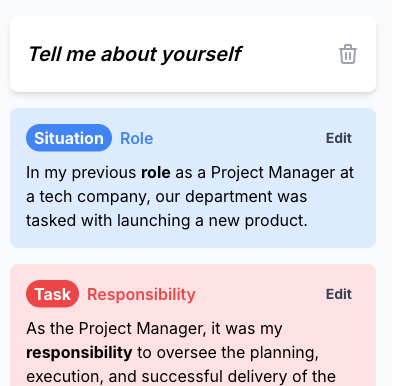How to Answer 'Tell Me About a Time When...' in a Job Interview
Wed May 29 2024•Author: InterviewPro AI
Interviewers use the "Tell me about a time where..." question to see how you handle real work situations. It helps them understand your problem-solving skills, how you work with others, and if you fit the job. Knowing how to answer this question can boost your chances of getting hired. In this guide, we’ll show you how to prepare a strong answer.
Takeaways
-
Pick a real experience: Choose a real work story that shows your skills and how you handled a situation.
-
Stay relevant: Make sure your story matches the job you're applying for. This shows you're a good fit.
-
Use the STAR method: Structure your answer with Situation, Task, Action, and Result. This keeps your answer clear and focused.
-
Show results: Highlight the positive outcome or result from your actions. This proves you can deliver good results.
-
Be brief and clear: Keep your answer short and to the point. Don’t ramble, and stick to the important details.
Five Answers on How to Respond to "Tell me about a time where..."
Answer 1:
Sure, I can tell you about a time when I took on a leadership role in a group project at my previous job. I was able to effectively delegate tasks, communicate clearly with my team members, and ensure that we met our deadlines successfully. This experience helped me develop my leadership skills and ability to work collaboratively with others towards a common goal.
Answer Breakdown: The response effectively showcases the applicant's ability to take on a leadership role, delegate tasks, communicate effectively, and achieve goals within a team setting. It demonstrates their experience and skills in leadership, teamwork, and project management.
Answer 2:
I once had a project deadline moved up unexpectedly. I quickly organized my tasks, prioritized them, and communicated with my team to coordinate efforts. We worked efficiently and met the new deadline successfully.
Answer Breakdown: This response effectively demonstrates the candidate's ability to adapt to unexpected changes, organize tasks, prioritize effectively, and communicate efficiently with team members to achieve a common goal. It showcases the candidate's problem-solving skills and ability to work well under pressure.
Answer 3:
During my last job, I had to lead a team to meet a tight deadline for a project. I organized weekly check-ins, delegated tasks effectively, and ensured open communication among team members. As a result, we successfully completed the project on time and exceeded the client's expectations.
Answer Breakdown: The response effectively showcases the candidate's ability to lead a team, organize tasks, and communicate effectively to achieve a common goal. It demonstrates their experience in project management and highlights their success in meeting deadlines and exceeding client expectations.
Answer 4:
Sure, I can tell you about a time where I demonstrated leadership skills. In my previous job, I led a team project to revamp our company's customer service process. I assigned tasks, set deadlines, and ensured everyone's strengths were utilized. As a result, we were able to streamline the process, leading to improved customer satisfaction ratings.
Answer Breakdown: The response effectively showcases the candidate's leadership skills by providing a specific example from their past experience. By detailing the actions taken to lead a team project and the positive outcome achieved, the candidate demonstrates their ability to effectively manage a team and drive successful results.
Answer 5:
During my previous job as a customer service representative, I encountered an upset customer who was dissatisfied with our product. I actively listened to their concerns, empathized with their situation, and offered a solution that met their needs. By addressing the issue promptly and effectively, I was able to turn the situation around and leave the customer satisfied with our service.
Answer Breakdown: The response effectively demonstrates the candidate's ability to handle difficult situations with customers by actively listening, showing empathy, and providing a satisfactory solution. It showcases the candidate's strong communication and problem-solving skills in a customer service setting.
Five STAR Method Answers on How to Respond to "Tell me about a time where..."
STAR Answer 1:
Situation: In my previous job, I was tasked with organizing a company-wide event to celebrate a major milestone.
Task: My task was to plan and execute the event within a tight budget and timeframe.
Action: I created a detailed event plan outlining all aspects such as venue, catering, entertainment, and logistics. I also negotiated with vendors for the best deals and coordinated with different departments to ensure smooth execution.
Result: The event was a huge success, with positive feedback from attendees and management. It brought the whole company together and boosted morale.
STAR Answer Breakdown: The response effectively follows the STAR (Situation, Task, Action, Result) method to provide a structured and detailed account of the applicant's experience in organizing a company event. It showcases their ability to plan, coordinate, and execute a successful event within constraints, highlighting their organizational and communication skills.
STAR Answer 2:
Situation: In my previous role as a project manager, I was responsible for leading a team through a tight deadline on a new product launch.
Task: The task was to ensure that all team members were motivated and working efficiently to meet the project deadline.
Action: I scheduled regular check-in meetings to discuss progress, address any obstacles, and provide support where needed. I also delegated tasks effectively based on team members' strengths and skills.
Result: By maintaining open communication, providing support, and optimizing task assignments, we successfully launched the product on time and received positive feedback from both customers and stakeholders.
STAR Answer Breakdown: The response effectively follows the STAR method (Situation, Task, Action, Result) to provide a structured and detailed example of the applicant's experience in project management. It showcases their ability to lead a team, communicate effectively, delegate tasks, and achieve successful outcomes under pressure.
STAR Answer 3:
Situation: During my previous job, I was tasked with organizing a big team-building event for our department.
Task: The goal was to boost morale and improve teamwork among team members.
Action: I first surveyed the team to understand their preferences and interests. Then, I researched and proposed various team-building activities and venues to management for approval. Once the plan was finalized, I delegated tasks among team members to ensure everything was organized smoothly.
Result: The event was a success, and team members enjoyed themselves while bonding with each other. As a result, there was a noticeable improvement in communication and collaboration within the team in the following weeks.
STAR Answer Breakdown: This response effectively follows the STAR (Situation, Task, Action, Result) method to provide a structured and detailed account of the candidate's experience in organizing a team-building event. It showcases the candidate's ability to plan, delegate tasks, and achieve a successful outcome, highlighting their skills in communication, organization, and teamwork.
STAR Answer 4:
Situation: I was leading a team project to launch a new product within a tight deadline.
Task: My task was to ensure that each team member understood their roles and responsibilities to meet the project deadline successfully.
Action: I scheduled regular team meetings to discuss progress, addressed any challenges faced by team members, and provided support and guidance whenever needed.
Result: By effectively communicating, delegating tasks, and providing support, we were able to launch the new product on time, exceeding expectations and receiving positive feedback from both our superiors and customers.
STAR Answer Breakdown: The response effectively follows the STAR method (Situation, Task, Action, Result) to provide a structured and detailed account of the applicant's experience in leading a team project. It showcases their ability to communicate, delegate tasks, address challenges, and achieve successful outcomes within a tight deadline.
STAR Answer 5:
Situation: At my previous job, I was tasked with organizing a company-wide charity event to raise funds for a local animal shelter.
Task: My task was to coordinate all aspects of the event, including securing a venue, promoting the event, and ensuring a successful turnout.
Action: I created a detailed timeline with deadlines for each task, delegated responsibilities to a volunteer team, and utilized social media platforms to spread the word about the event. I also reached out to local businesses for donations for raffle prizes and sponsorships.
Result: The event was a success, with a large turnout and generous donations from attendees and sponsors. We were able to raise a significant amount of money for the animal shelter and increase awareness about their cause within the community.
STAR Answer Breakdown: The response effectively follows the STAR method (Situation, Task, Action, Result) to provide a structured and detailed account of the applicant's experience organizing a charity event. It showcases their ability to plan, delegate, communicate, and achieve successful outcomes in a team setting.
Can't find what you're looking for?
Try our AI-Powered Interview Preparation Tools
Prepare for your job interview with our AI tools. Tailored answers, custom questions, and STAR method responses.


